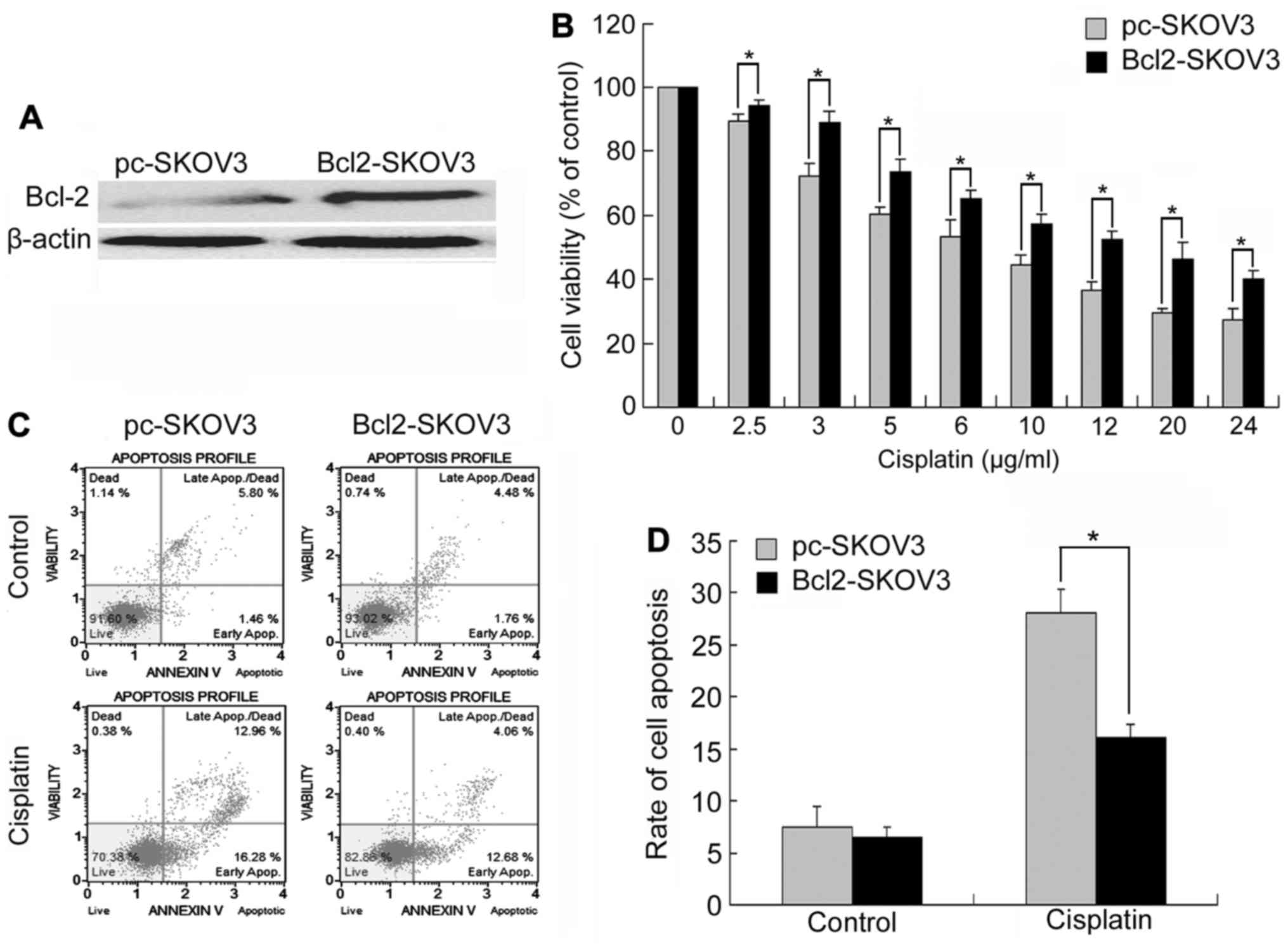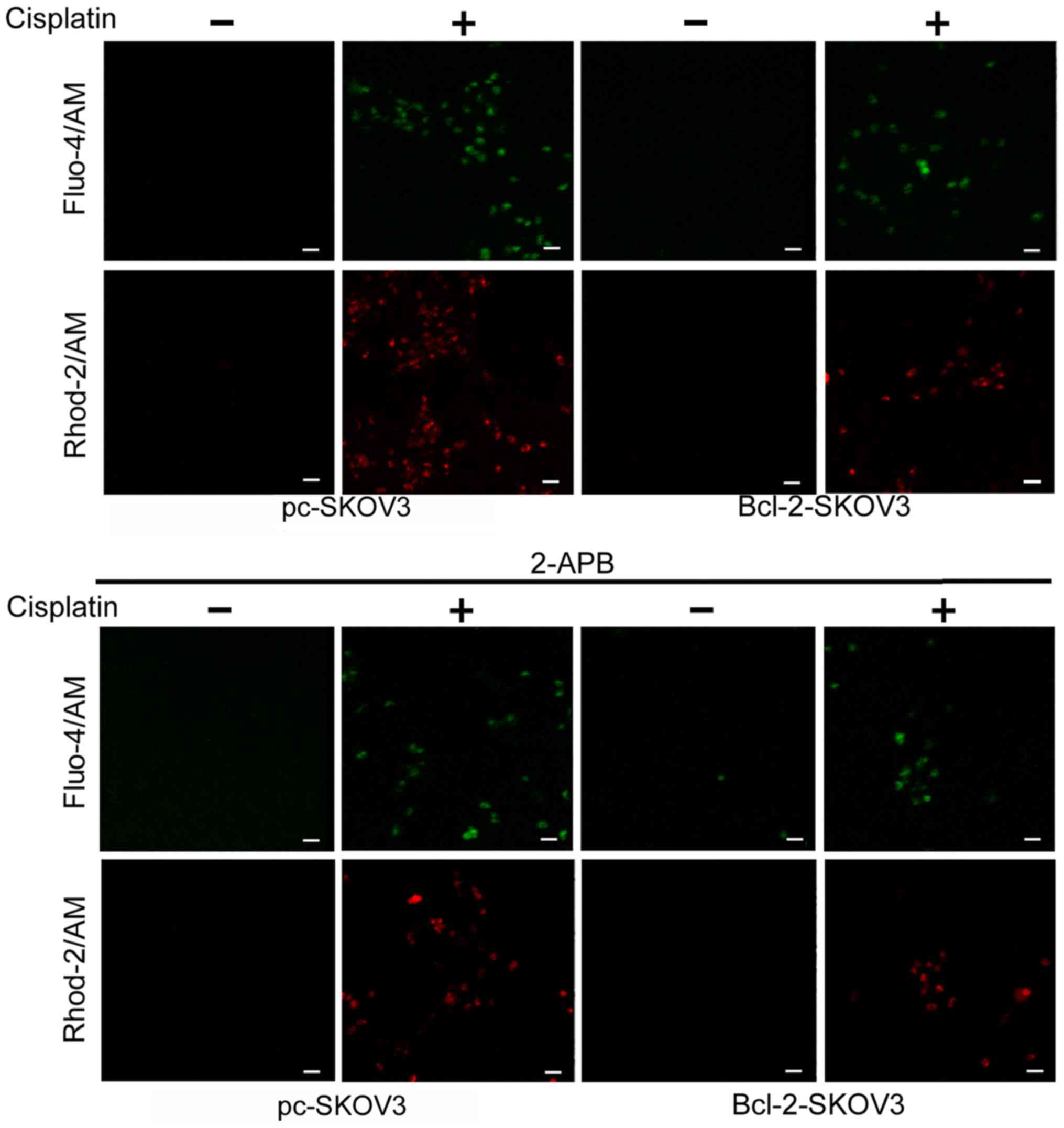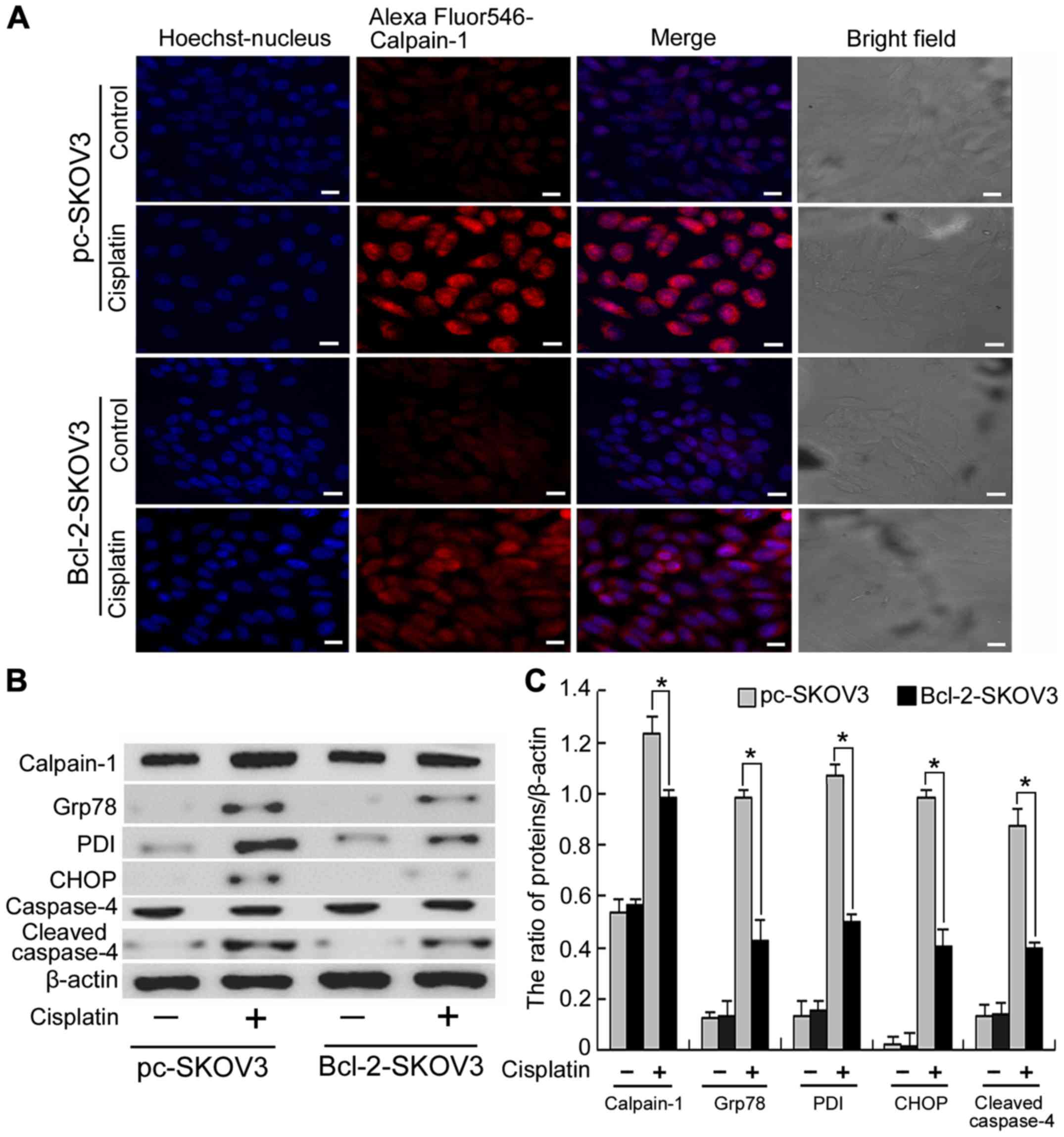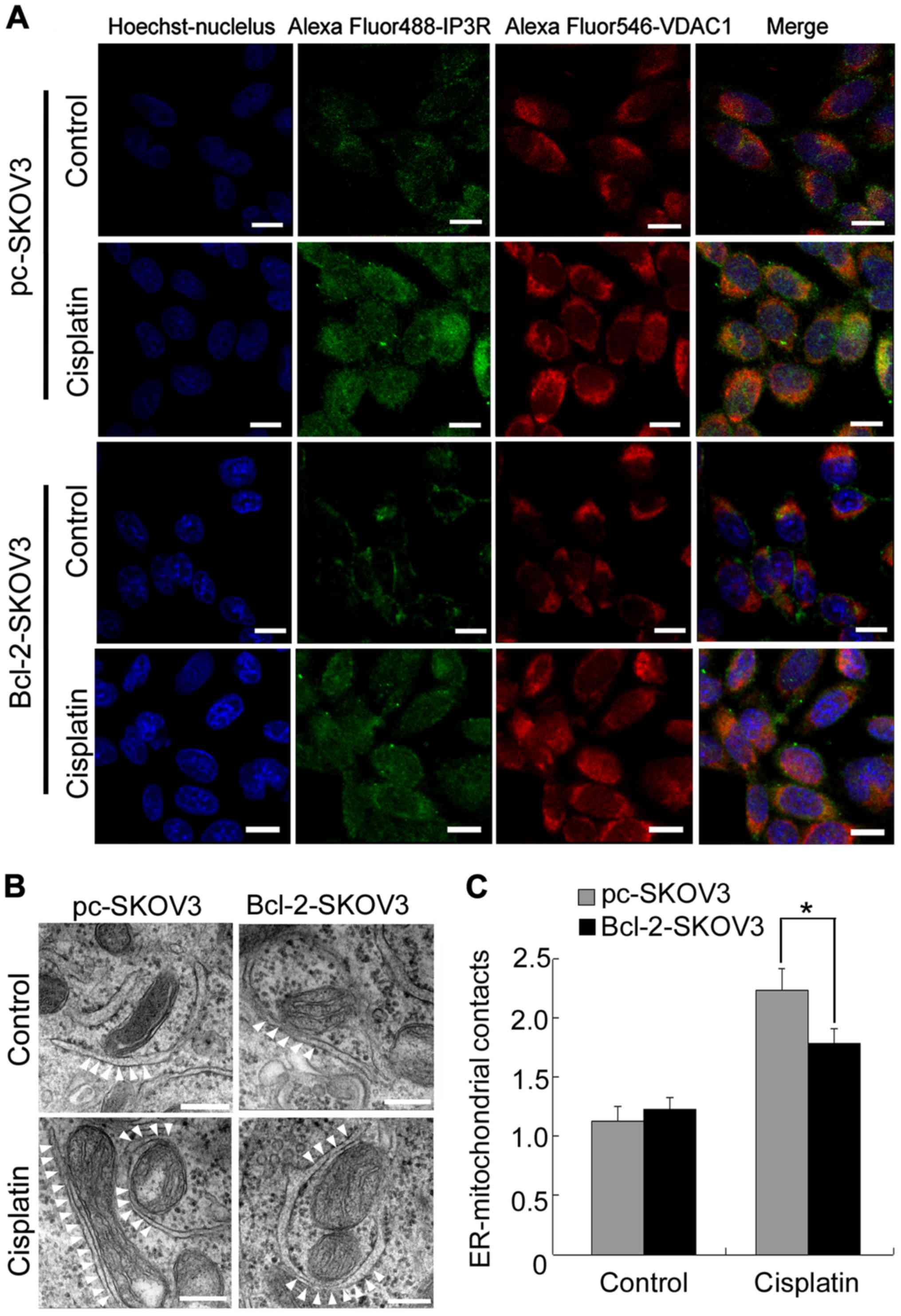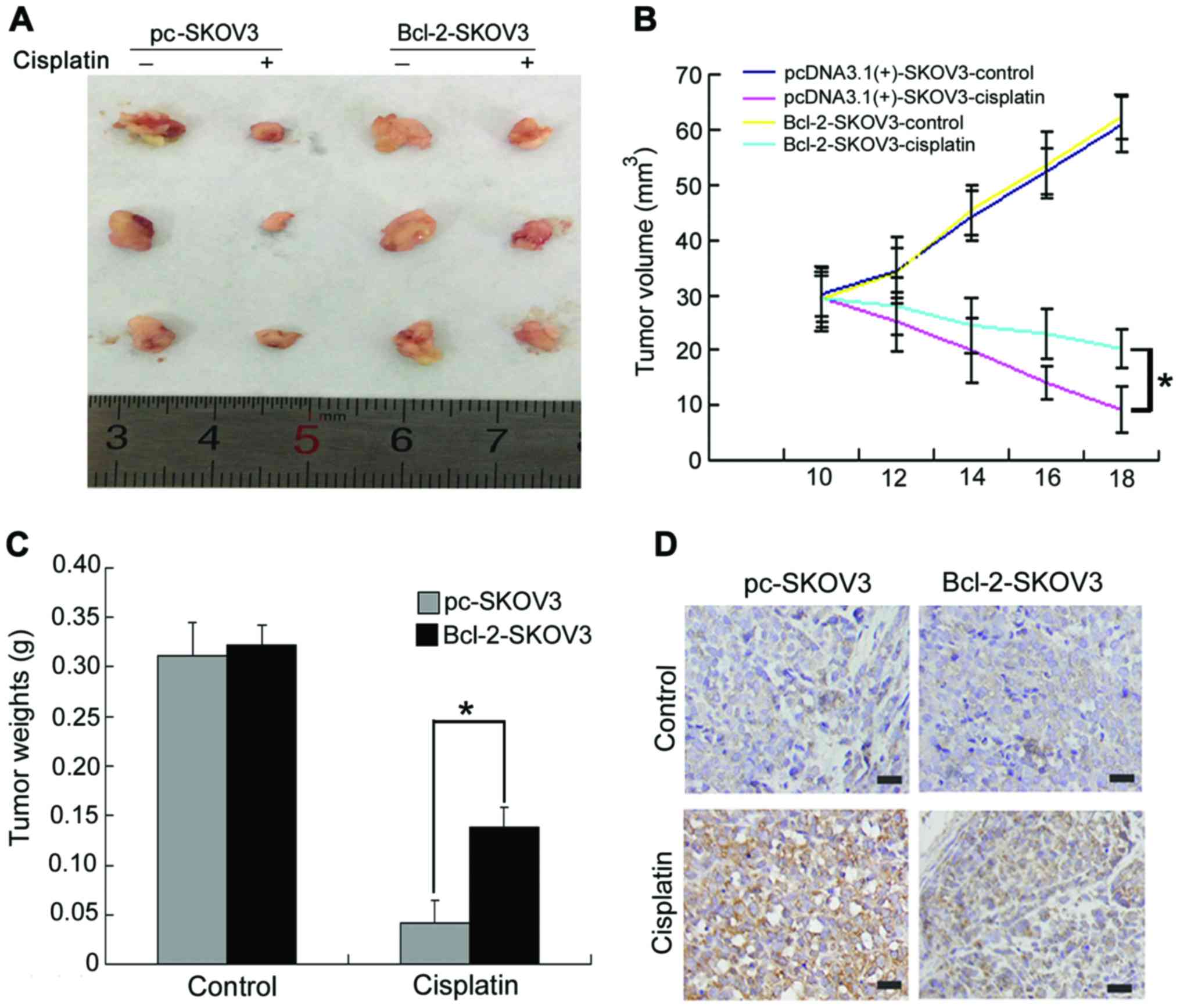|
1
|
Muralidhar GG and Barbolina MV: The
miR-200 family: Versatile players in epithelial ovarian cancer. Int
J Mol Sci. 16:16833–16847. 2015. View Article : Google Scholar : PubMed/NCBI
|
|
2
|
Sapiezynski J, Taratula O,
Rodriguez-Rodriguez L and Minko T: Precision targeted therapy of
ovarian cancer. J Control Release. 243:250–268. 2016. View Article : Google Scholar : PubMed/NCBI
|
|
3
|
Guo P, Xiong X, Zhang S and Peng D:
miR-100 resensitizes resistant epithelial ovarian cancer to
cisplatin. Oncol Rep. 36:3552–3558. 2016. View Article : Google Scholar : PubMed/NCBI
|
|
4
|
Dai Y, Jin S, Li X and Wang D: The
involvement of Bcl-2 family proteins in AKT-regulated cell survival
in cisplatin resistant epithelial ovarian cancer. Oncotarget.
8:1354–1368. 2017.PubMed/NCBI
|
|
5
|
Hirata H, Lopes GS, Jurkiewicz A,
Garcez-do-Carmo L and Smaili SS: Bcl-2 modulates endoplasmic
reticulum and mitochondrial calcium stores in PC12 cells. Neurochem
Res. 37:238–243. 2012. View Article : Google Scholar : PubMed/NCBI
|
|
6
|
Pan Z and Gollahon L: Paclitaxel
attenuates Bcl-2 resistance to apoptosis in breast cancer cells
through an endoplasmic reticulum-mediated calcium release in a
dosage dependent manner. Biochem Biophys Res Commun. 432:431–437.
2013. View Article : Google Scholar : PubMed/NCBI
|
|
7
|
Cui C, Merritt R, Fu L and Pan Z:
Targeting calcium signaling in cancer therapy. Acta Pharm Sin B.
7:3–17. 2017. View Article : Google Scholar : PubMed/NCBI
|
|
8
|
Stary CM, Sun X, Ouyang Y, Li L and
Giffard RG: miR-29a differentially regulates cell survival in
astrocytes from cornu ammonis 1 and dentate gyrus by targeting
VDAC1. Mitochondrion. 30:248–254. 2016. View Article : Google Scholar : PubMed/NCBI
|
|
9
|
Arbel N and Shoshan-Barmatz V:
Voltage-dependent anion channel 1-based peptides interact with
Bcl-2 to prevent antiapoptotic activity. J Biol Chem.
285:6053–6062. 2010. View Article : Google Scholar : PubMed/NCBI
|
|
10
|
Kilpatrick BS, Yates E, Grimm C, Schapira
AH and Patel S: Endo-lysosomal TRP mucolipin-1 channels trigger
global ER Ca2+ release and Ca2+ influx. J
Cell Sci. 129:3859–3867. 2016. View Article : Google Scholar : PubMed/NCBI
|
|
11
|
Theurey P, Tubbs E, Vial G, Jacquemetton
J, Bendridi N, Chauvin MA, Alam MR, Le Romancer M, Vidal H and
Rieusset J: Mitochondria-associated endoplasmic reticulum membranes
allow adaptation of mitochondrial metabolism to glucose
availability in the liver. J Mol Cell Biol. 8:129–143. 2016.
View Article : Google Scholar : PubMed/NCBI
|
|
12
|
Area-Gomez E: Assessing the function of
mitochondria-associated ER membranes. Methods Enzymol. 547:181–197.
2014. View Article : Google Scholar : PubMed/NCBI
|
|
13
|
Giorgi C, Wieckowski MR, Pandolfi PP and
Pinton P: Mitochondria associated membranes (MAMs) as critical hubs
for apoptosis. Commun Integr Biol. 4:334–335. 2011. View Article : Google Scholar : PubMed/NCBI
|
|
14
|
Qi H and Shuai J: Alzheimers disease via
enhanced calcium signaling caused by the decrease of endoplasmic
reticulum-mitochondrial distance. Med Hypotheses. 89:28–31. 2016.
View Article : Google Scholar : PubMed/NCBI
|
|
15
|
Arruda AP, Pers BM, Parlakgül G, Güney E,
Inouye K and Hotamisligil GS: Chronic enrichment of hepatic
endoplasmic reticulum-mitochondria contact leads to mitochondrial
dysfunction in obesity. Nat Med. 20:1427–1435. 2014. View Article : Google Scholar : PubMed/NCBI
|
|
16
|
Krols M, Bultynck G and Janssens S:
ER-Mitochondria contact sites: A new regulator of cellular calcium
flux comes into play. J Cell Biol. 214:367–370. 2016. View Article : Google Scholar : PubMed/NCBI
|
|
17
|
Xie Q, Su J, Jiao B, Shen L, Ma L, Qu X,
Yu C, Jiang X, Xu Y and Sun L: ABT737 reverses cisplatin resistance
by regulating ER-mitochondria Ca2+ signal transduction
in human ovarian cancer cells. Int J Oncol. 49:2507–2519. 2016.
View Article : Google Scholar : PubMed/NCBI
|
|
18
|
Albu DF, Albu CC, Văduva CC, Niculescu M
and Edu A: Diagnosis problems in a case of ovarian tumor - case
presentation. Rom J Morphol Embryol. 57:1437–1442. 2016.PubMed/NCBI
|
|
19
|
Zhu X, Ji M, Han Y, Guo Y, Zhu W, Gao F,
Yang X and Zhang C: PGRMC1-dependent autophagy by hyperoside
induces apoptosis and sensitizes ovarian cancer cells to cisplatin
treatment. Int J Oncol. 50:835–846. 2017. View Article : Google Scholar : PubMed/NCBI
|
|
20
|
Tung MC, Lin PL, Cheng YW, Wu DW, Yeh SD,
Chen CY and Lee H: Reduction of microRNA-184 by E6 oncoprotein
confers cisplatin resistance in lung cancer via increasing Bcl-2.
Oncotarget. 7:32362–32374. 2016. View Article : Google Scholar : PubMed/NCBI
|
|
21
|
Nishioka T, Luo LY, Shen L, He H,
Mariyannis A, Dai W and Chen C: Nicotine increases the resistance
of lung cancer cells to cisplatin through enhancing Bcl-2
stability. Br J Cancer. 110:1785–1792. 2014. View Article : Google Scholar : PubMed/NCBI
|
|
22
|
Williams A, Hayashi T, Wolozny D, Yin B,
Su TC, Betenbaugh MJ and Su TP: The non-apoptotic action of Bcl-xL:
Regulating Ca2+ signaling and bioenergetics at the
ER-mitochondrion interface. J Bioenerg Biomembr. 48:211–225. 2016.
View Article : Google Scholar : PubMed/NCBI
|
|
23
|
Shen L, Wen N, Xia M, Zhang YU, Liu W, Xu
YE and Sun L: Calcium efflux from the endoplasmic reticulum
regulates cisplatin-induced apoptosis in human cervical cancer HeLa
cells. Oncol Lett. 11:2411–2419. 2016. View Article : Google Scholar : PubMed/NCBI
|
|
24
|
Ma SH, Zhuang QX, Shen WX, Peng YP and Qiu
YH: Interleukin-6 reduces NMDAR-mediated cytosolic Ca2+
overload and neuronal death via JAK/CaN signaling. Cell Calcium.
58:286–295. 2015. View Article : Google Scholar : PubMed/NCBI
|
|
25
|
Wang C, Shi D, Song X, Chen Y, Wang L and
Zhang X: Calpain inhibitor attenuates ER stress-induced apoptosis
in injured spinal cord after bone mesenchymal stem cells
transplantation. Neurochem Int. 97:15–25. 2016. View Article : Google Scholar : PubMed/NCBI
|
|
26
|
Demaurex N and Rosselin M: Redox control
of mitochondrial calcium uptake. Mol Cell. 65:961–962. 2017.
View Article : Google Scholar : PubMed/NCBI
|
|
27
|
Pendin D, Greotti E and Pozzan T: The
elusive importance of being a mitochondrial Ca2+
uniporter. Cell Calcium. 55:139–145. 2014. View Article : Google Scholar : PubMed/NCBI
|
|
28
|
Hu XY, Liang JY, Guo XJ, Liu L and Guo YB:
5-Fluorouracil combined with apigenin enhances anticancer activity
through mitochondrial membrane potential (ΔΨm)-mediated apoptosis
in hepatocellular carcinoma. Clin Exp Pharmacol Physiol.
42:146–153. 2015. View Article : Google Scholar : PubMed/NCBI
|
|
29
|
Galmes R, Houcine A, van Vliet AR,
Agostinis P, Jackson CL and Giordano F: ORP5/ORP8 localize to
endoplasmic reticulum-mitochondria contacts and are involved in
mitochondrial function. EMBO Rep. 17:800–810. 2016. View Article : Google Scholar : PubMed/NCBI
|
|
30
|
Joshi AU, Kornfeld OS and Mochly-Rosen D:
The entangled ER-mitochondrial axis as a potential therapeutic
strategy in neurodegeneration: A tangled duo unchained. Cell
Calcium. 60:218–234. 2016. View Article : Google Scholar : PubMed/NCBI
|
|
31
|
Grimm S: The ER-mitochondria interface:
The social network of cell death. Biochim Biophys Acta.
1823:327–334. 2012. View Article : Google Scholar : PubMed/NCBI
|
|
32
|
Raturi A and Simmen T: Where the
endoplasmic reticulum and the mitochondrion tie the knot: The
mitochondria-associated membrane (MAM). Biochim Biophys Acta.
1833:213–224. 2013. View Article : Google Scholar : PubMed/NCBI
|
|
33
|
Doghman-Bouguerra M, Granatiero V, Sbiera
S, Sbiera I, Lacas-Gervais S, Brau F, Fassnacht M, Rizzuto R and
Lalli E: FATE1 antagonizes calcium- and drug-induced apoptosis by
uncoupling ER and mitochondria. EMBO Rep. 17:1264–1280. 2016.
View Article : Google Scholar : PubMed/NCBI
|















